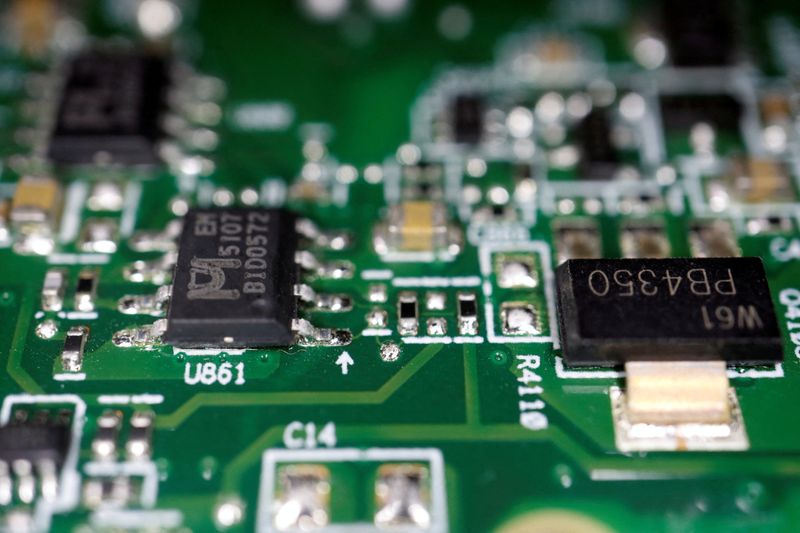By Alexandra Alper and Karen Freifeld
(Reuters) - The Biden administration is considering closing a loophole that gives Chinese companies access to American artificial intelligence (AI) chips through units located overseas, according to four people familiar with the matter.
The United States last year shook relations with Beijing when it unveiled new restrictions on shipments of AI chips and chipmaking tools to China, seeking to thwart its military advances.
Those rules are set to be tightened in the coming days. A person familiar with the situation said the measures could be included in those new restrictions.
In the initial round of curbs, the Biden administration left overseas subsidiaries of Chinese companies with unfettered access to the same semiconductors, meaning they could easily be smuggled into China or accessed remotely by China-based users.
Reuters reported in June that the very chips barred by U.S. regulations could be purchased from vendors in the famed Huaqiangbei electronics area in the southern Chinese city of Shenzhen.
Washington is now considering ways to close the loophole, sources said, a move that has not been previously reported.
In response to a question on the Reuters report, Chinese foreign ministry spokesperson Wang Wenbin on Friday repeated China's stance that it opposes U.S. attempts to "politicise" chip supply chains and would "closely follow" these potential curbs.
The efforts to close the loophole show how the Biden administration is struggling to cut China off from top AI technology and how difficult it is to plug every gap in export controls.
"Absolutely, Chinese firms are purchasing chips for use in data centres abroad," said Greg Allen, a director at the Center for Strategic and International Studies, noting that Singapore is a big hub for cloud computing.
The Commerce Department declined to comment. A representative from the Chinese Embassy in Washington did not immediately respond to a request for comment.
China's Ministry of Commerce has previously accused the U.S. of abusing export controls and called for it to "stop its unreasonable suppression of Chinese companies."
While it would be illegal under U.S. law to ship those AI chips to mainland China, it is very difficult for the United States to police those transactions, experts said, noting that China-based employees could legally access the chips located at foreign subsidiaries remotely as well.
"We don't actually know how big a problem this is," said Hanna Dohmen, a Research Analyst at Georgetown University's Center for Security and Emerging Technology (CSET).
The United States has been seeking to halt the rise of China's artificial intelligence capability, which helps its military develop unmanned combat systems, according to a report in The International Affairs Review, affiliated with George Washington University’s School of International Affairs.
China's AI capability depends on its access to U.S. chips. CSET found in a June 2022 report that out of 97 individual AI chips procured via Chinese military tenders over an 8-month period in 2020, nearly all of them were designed by U.S.-based companies Nvidia (NASDAQ:NVDA), Xilinx (NASDAQ:XLNX), Intel (NASDAQ:INTC), and Microsemi.
Washington has been working to close other loopholes that allow the AI chips into China. In August, it told Nvidia and AMD to restrict shipments of the AI chips beyond China to other regions, including some countries in the Middle East.
Sources said the new rules on AI chips expected this month will likely apply those same restrictions more broadly to all companies in the market.

It is less clear how the U.S. government might close the loophole allowing Chinese parties to access U.S. cloud providers like Amazon (NASDAQ:AMZN) Web Services, which give their customers access to the same AI capabilities. But sources say the Biden administration is grappling with that issue as well.
"Chinese persons can completely legally access the same chips from anywhere in the world. There are no rules about how they can be accessed," said Timothy Fist, a fellow at Washington-based think tank Center for a New American Security.